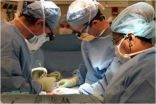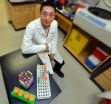(Press-News.org) BOSTON, MA—According to a new study, the last few meals before surgery might make a difference in recovery after surgery. Fat tissue is one of the most dominant components that make up the body, and fat tissue is always traumatized during major surgery.
Researchers at Brigham and Women's Hospital (BWH) found that this direct trauma greatly impacts the chemical balance of fat tissue—chemicals that are known to communicate with nearby and distant organs. In the study, mice that consumed a typical Western, high-fat diet showed an exaggerated imbalanced response. Importantly, restricting food intake to a lower-fat diet just a few weeks before surgery reduced the imbalance back toward a more normal response.
The study is published in the April 2013 issue of Surgery.
Senior study author C. Keith Ozaki, MD, Director of BWH Vascular Surgery Research, and colleagues measured how fat responds to surgery and whether restricting calorie intake before surgery changed how the fat tissue responded to typical trauma that usually occurs during an operation.
"Surgeons have learned that generally minimizing trauma accelerates patient recovery from surgery," noted Ozaki. "While we do this well for specific organs such as the heart, blood vessels, liver, and so forth, we historically have paid little attention to the fat that we cut through to expose these organs. Our findings challenge us all to learn more about how fat responds to trauma, what factors impact this response, and how fat's response is linked to the outcome of individual patients."
Researchers fed one group of mice a high-fat diet (containing 60 percent calories from fat), while a control group was given a more normal diet (containing 10 percent calories from fat).
Three weeks before surgery, researchers switched some of the high-fat diet mice to the normal diet. During surgery, the researchers performed procedures that would occur during a typical operation and observed that such surgical trauma rapidly affected the fat tissues located both near and away from the trauma site. This resulted in increased inflammation and decreased specialized fat hormone synthesis, especially in the young adult mice and those that had a simulated wound infection.
However, reducing food intake before surgery tended to reverse these activities for all mice age groups, even in the setting of the simulated infection. The results suggest that while fat is a very dominant tissue in the human body, its ability to rapidly change might be leveraged to lessen complications in humans during stressful situations such as surgery.
In an accompanying review article composed with key collaborator James Mitchell, PhD, assistant professor of Genetics and Complex Diseases, Harvard School of Public Health, the researchers suggest that restricting diet in humans before surgery provides a unique opportunity to test whether this method will decrease the incidence and severity of surgical complications brought on by over-exuberant inflammation and other stressors.
Simply cutting out certain dietary elements (without malnutrition) may be a feasible, inexpensive and effective way of protecting the body against stress from an operation. In the review article, the researchers specifically point to further studying this method in patients undergoing vascular surgery, a population that faces increased risks of surgical complications such as wound-healing problems, heart attack and stroke.
"The relationship between surgical outcomes and obesity has always been complex," said Ozaki. "Our results and those of others highlight that the quality of your fat tissues appears to be important, along with the total amount of body fat when it comes to the body's response to an operation."
INFORMATION:
The study was supported by the National Heart, Lung, and Blood Institute of the National Institutes of Health; American Heart Association; Ellison Medical Foundation; and Glenn Foundation.
The research team included partners from the Center for Cancer Computational Biology at the Dana-Farber Cancer Institute, and the Department of Genetics and Complex Diseases at the Harvard School of Public Health.
Brigham and Women's Hospital (BWH) is a 793-bed nonprofit teaching affiliate of Harvard Medical School and a founding member of Partners HealthCare. BWH has more than 3.5 million annual patient visits, is the largest birthing center in New England and employs nearly 15,000 people. The Brigham's medical preeminence dates back to 1832, and today that rich history in clinical care is coupled with its national leadership in patient care, quality improvement and patient safety initiatives, and its dedication to research, innovation, community engagement and educating and training the next generation of health care professionals. Through investigation and discovery conducted at its Biomedical Research Institute (BRI), BWH is an international leader in basic, clinical and translational research on human diseases, involving nearly 1,000 physician-investigators and renowned biomedical scientists and faculty supported by nearly $625 million in funding. BWH continually pushes the boundaries of medicine, including building on its legacy in organ transplantation by performing the first face transplants in the U.S. in 2011. BWH is also home to major landmark epidemiologic population studies, including the Nurses' and Physicians' Health Studies, OurGenes and the Women's Health Initiative. For more information and resources, please visit BWH's online newsroom.
What you eat before surgery may affect your recovery
New pre-clinical research describes fat-based insights into how the body responds to surgery and suggests new approaches to reduce surgical complications
2013-03-21
ELSE PRESS RELEASES FROM THIS DATE:
Researchers tackle physician challenge of correctly ordering laboratory tests
2013-03-21
(Boston) – A new study involving researchers from the Boston University School of Medicine (BUSM) has identified barriers that clinicians face in correctly ordering appropriate laboratory tests and highlights some solutions that may simplify this process and improve patient outcomes. The study, published in the March 2013 issue of the Journal of General Internal Medicine, was led by Elissa Passiment, EdM, of the American Society for Clinical Laboratory Science and James L. Meisel, MD, associate professor of medicine at BUSM.
Passiment, Meisel and colleagues identified ...
Global nitrogen availability consistent for past 500 years, linked to carbon levels
2013-03-21
MANHATTAN -- A Kansas State University research team has found that despite humans increasing nitrogen production through industrialization, nitrogen availability in many ecosystems has remained steady for the past 500 years. Their work appears in the journal Nature.
"People have been really interested in nitrogen in current times because it's a major pollutant," said Kendra McLauchlan, assistant professor of geography and director of the university's Paleoenvironmental Laboratory. "Humans are producing a lot more nitrogen than in the past for use as crop fertilizer, ...
'Gene Therapy for Human Disease: Clinical Advances and Challenges'
2013-03-21
Philadelphia, PA, March 21, 2013 – The April issue of Translational Research examines the progress and outlook of gene therapy research, with a specific focus on the clinical applicability of gene therapy today. Research articles included in the special issue highlight current studies that, after decades of trial and error, may provide evidence for a clear path of treatment and cure for many diseases. There are more than 1,800 genetic disorders known in humans, and only a small fraction of these can be treated and even fewer cured. Some of these disorders are exceedingly ...
'Sideline quasars' helped to stifle early galaxy formation, says CU-Boulder study
2013-03-21
University of Colorado Boulder astronomers targeting one of the brightest quasars glowing in the universe some 11 billion years ago say "sideline quasars" likely teamed up with it to heat abundant helium gas billions of years ago, preventing small galaxy formation.
CU-Boulder Professor Michael Shull and Research Associate David Syphers used the Hubble Space Telescope to look at the quasar -- the brilliant core of an active galaxy that acted as a "lighthouse" for the observations -- to better understand the conditions of the early universe. The scientists studied gaseous ...
Reward linked to image is enough to activate brain's visual cortex
2013-03-21
Once rhesus monkeys learn to associate a picture with a reward, the reward by itself becomes enough to alter the activity in the monkeys' visual cortex. This finding was made by neurophysiologists Wim Vanduffel and John Arsenault (KU Leuven and Harvard Medical School) and American colleagues using functional brain scans and was published recently in the leading journal Neuron.
Our visual perception is not determined solely by retinal activity. Other factors also influence the processing of visual signals in the brain. "Selective attention is one such factor," says Professor ...
Do disruptions in brain communication have a role in autism?
2013-03-21
New Rochelle, NY, March 21, 2013—A new study of patterns of brain communication in toddlers with autism shows evidence of aberrant neural communication even at this relatively early stage of brain development. The results are presented in an article in Brain Connectivity, a bimonthly peer-reviewed journal from Mary Ann Liebert, Inc., publishers. The article is available free on the Brain Connectivity website at http://www.liebertpub.com/brain.
A team of researchers from The Netherlands (University Medical Center Utrecht and Utrecht University, Radboud University Nijmegen ...
Cancer drug shortages mean higher costs and greater risk for patients
2013-03-21
A national survey of health professionals showed that drug shortages are taking a heavy toll on cancer patients, forcing treatment changes and delays that for some patients meant worse outcomes, more therapy-related complications and higher costs. St. Jude Children's Research Hospital investigators played an important role in the study.
The survey queried oncology pharmacists and others involved in managing cancer drug shortages for academic medical centers, community hospitals and other cancer treatment facilities nationwide. Of the 243 individuals who completed the ...
Scientists identify gene that is consistently altered in obese individuals
2013-03-21
AUGUSTA, Ga. – Food and environment can chemically alter your gene function and scientists have identified a gene that is consistently altered in obesity.
The gene LY86 was among a group of 100 genes identified as likely contributors to obesity through genome-wide association studies comparing the DNA of thousands of obese and lean individuals, said Dr. Shaoyong Su, genetic epidemiologist at the Medical College of Georgia at Georgia Regents University.
Su looked at progressively larger groups of obese versus lean individuals and found LY86 consistently and highly chemically ...
Researchers' new method may sharpen microscopic images
2013-03-21
UT Dallas researchers are developing a new low-light imaging method that could improve a number of scientific applications, including the microscopic imaging of single molecules in cancer research.
Electrical engineering professor Dr. Raimund Ober and his team recently published their findings in the journal Nature Methods. In the journal, they describe a method which minimizes the deterioration of images that can occur with conventional imaging approaches.
"Any image you take of an object is translated by the camera into pixels with added electronic noise," Ober said. ...
Do I know you? Memory patterns help us recall the social webs we weave, finds new Cornell study
2013-03-21
ITHACA, N.Y. — With a dizzying number of ties in our social networks – that your Aunt Alice is a neighbor of Muhammad who is married to Natasha who is your wife's boss – it's a wonder we remember any of it. How do we keep track of the complexity? We cheat, says a Cornell University sociologist in Scientific Reports (March 21), a publication of Nature.
Study: http://www.nature.com/srep/2013/130321/srep01513/full/srep01513.html
Humans keep track of social information not by rote memorization but with simplifying rules, as you might remember a number sequence that always ...
LAST 30 PRESS RELEASES:
Tiny bubbles, big breakthrough: Cracking cancer’s “fortress”
A biological material that becomes stronger when wet could replace plastics
Glacial feast: Seals caught closer to glaciers had fuller stomachs
Get the picture? High-tech, low-cost lens focuses on global consumer markets
Antimicrobial resistance in foodborne bacteria remains a public health concern in Europe
Safer batteries for storing energy at massive scale
How can you rescue a “kidnapped” robot? A new AI system helps the robot regain its sense of location in dynamic, ever-changing environments
Brainwaves of mothers and children synchronize when playing together – even in an acquired language
A holiday to better recovery
Cal Poly’s fifth Climate Solutions Now conference to take place Feb. 23-27
Mask-wearing during COVID-19 linked to reduced air pollution–triggered heart attack risk in Japan
Achieving cross-coupling reactions of fatty amide reduction radicals via iridium-photorelay catalysis and other strategies
Shorter may be sweeter: Study finds 15-second health ads can curb junk food cravings
Family relationships identified in Stone Age graves on Gotland
Effectiveness of exercise to ease osteoarthritis symptoms likely minimal and transient
Cost of copper must rise double to meet basic copper needs
A gel for wounds that won’t heal
Iron, carbon, and the art of toxic cleanup
Organic soil amendments work together to help sandy soils hold water longer, study finds
Hidden carbon in mangrove soils may play a larger role in climate regulation than previously thought
Weight-loss wonder pills prompt scrutiny of key ingredient
Nonprofit leader Diane Dodge to receive 2026 Penn Nursing Renfield Foundation Award for Global Women’s Health
Maternal smoking during pregnancy may be linked to higher blood pressure in children, NIH study finds
New Lund model aims to shorten the path to life-saving cell and gene therapies
Researchers create ultra-stretchable, liquid-repellent materials via laser ablation
Combining AI with OCT shows potential for detecting lipid-rich plaques in coronary arteries
SeaCast revolutionizes Mediterranean Sea forecasting with AI-powered speed and accuracy
JMIR Publications’ JMIR Bioinformatics and Biotechnology invites submissions on Bridging Data, AI, and Innovation to Transform Health
Honey bees navigate more precisely than previously thought
Air pollution may directly contribute to Alzheimer’s disease
[Press-News.org] What you eat before surgery may affect your recoveryNew pre-clinical research describes fat-based insights into how the body responds to surgery and suggests new approaches to reduce surgical complications



